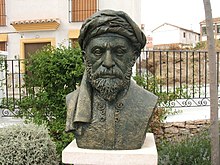ابوالحسن شوشتری
ابوالحسن شوشتری ( عربی: ابو الحسن الششتري) (۱۲۱۲ در Exfiliana، نزدیک گوآدیکس – ۱۲۶۹ در دمیاط [۱]) شیخ، فیلسوف، فقیه و شاعر صوفی اندلسی بود.[۲] وی در منطقهای به نام شوشتر (Exfiliana امروزی) واقع در وادی آش (گوآدیکس امروزی) در جنوب اندلس (اسپانیای امروزی) به دنیا آمد.[۳] او در میان آیندگان بیشتر به خاطر شعرهایش شناخته میشود، که برای خواندن در آهنگهایی طراحی شده بود که از تک آهنگهای ساده برای ستایش خدا با اصطلاح موسیقایی روزمره استفاده میکردند،[۴] که شهرت گستردهای فراتر از صدها شاگرد در برادری شوشتریه اش به دست آورد.[۵]
ابوالحسن شوشتری | |
|---|---|
 | |
| زاده | ۱۲۱۲ میلادی شوشتر (Exfiliana)، نزدیک گوآدیکس، اندلس |
| درگذشته | ۱۲۶۹ میلادی دمیاط، مصر |
| پیشه | شاعر و صوفی |
| ملیت | اندلسی |
| دلیل سرشناسی | شعرها، فرقه صوفی برادری شوشتریه |
| تأثیرگذاشته بر | موسیقی کلاسیک اندلس |
بسیاری از ابیات شعر ابوالحسن شوشتری (۶۲ شعر کوتاه به نام «توشیح») در موسیقی کلاسیک اندلس که امروزه در مراکش خوانده میشود، شناسایی شد.[نیازمند منبع]
پانویس ویرایش
- ↑ Poesía andalusí - Manuel Francisco Reina - 2007 - Al-Sustari A l-Sustari (1212-1269). Poeta y místico sufí. Nació cerca de Guadix en el pueblo de Sustar y murió cerca de Damietta durante una de sus..
- ↑ Corriente, F., Poesía estrófica (cejeles o muashahat) atribuida al místico granadino a-sh-shushtari, CSIC, Madrid, 1988.
- ↑ «ابوالحسن الششتری، الدیوان».
- ↑ Lourdes María Alvarez Abū al-Ḥasan al-Shushtarī: songs of love and devotion 2009 "By contrast, it was Shushtari 's special talent to use popular song and informal diction to talk about the divine. His were songs that could be enjoyed and interpreted at many levels, songs that not only rejected rank and privilege and"
- ↑ Page 5 "Shushtari's popular songs won him wide recognition, recognition that went far beyond the hundreds of disciples who formed the Sufi brotherhood known as the Shushtariyya (itself a branch of Ibn Sab'in's Sab'iniyya), an order eventually absorbed into the Shadhiliyya." Page 19 "Yet Ibn al-Khatib speaks of no rupture between the disciple and his master, instead claiming that Shushtari took over ... Furthermore, in both the I hat a and Rawdat al-tacrif, Ibn al-Khatib reproduces the complete text of Shushtari's ..."